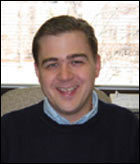
In the upcoming presidential election, the split between Democrat and Republican isnt the only division among Americans. The other gap: Those who vote and those who dont. Among those in the latter group are young Americans – the generation of 18- to 24-year olds whose political engagement has fallen by nearly 50 percent since the mid-1970s.p. Note: Hear and see Notre Dame political scientist David Campbells comments on the youth vote at:p. Broadband p. p. orp. Modem p. “Given that we live in highly polarized political times, if either party could successfully capitalize on this group of voters, it could very well be the swing group that could put either the Democrats or the Republicans over the top,” said David E. Campbell, assistant professor of political science at the University of Notre Dame.p. In the 1972 election, the first after passage of the 26th Amendment lowered the voting age to 18, about 55 percent of newly eligible voters ages 18 to 20 did so. Yet in the presidential election of 2000 – the closest race in modern history – only about 40 percent in that age range voted.p. Why the political apathy among this segment of the electorate? One reason is that they simply arent asked to vote.p. “When various groups of the population are contacted by parties or interest groups, we know that brings people to the polls,” Campbell said. “But young people are the least likely group in the electorate to be contacted by political mobilizers. Its important to convince parties that this is a segment of the electorate thats worth their attention.”p. Obstacles once considered by pundits to be reasons for the lack of political engagement by young Americans, such as not being registered to vote or difficulty in voting, are no longer problems.p. “Part of the responsibility falls on young people to demonstrate that they do have coherent and cohesive policy views that can be reflected in Washington, and that its worth the partys while to bring the group into the party,” Campbell said.p. “More work could also be done in schools before students graduate from high school, reminding them of the responsibilities that come with being a citizen.”p. A member of the Notre Dame faculty since 2002, Campbell specializes in American politics, political participation, religion and politics and education policy. He is a faculty fellow in Notre Dames Institute for Educational Initiatives and serves on the American Political Science Associations Committee on Civic Education and Engagement.p. _Media contact: David Campbell, (574) 631-7809, Campbell.91@nd.edu _ p.
TopicID: 6467